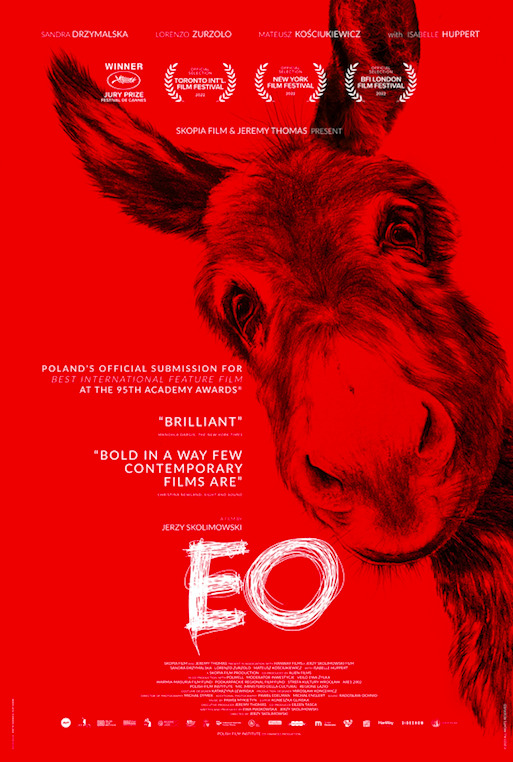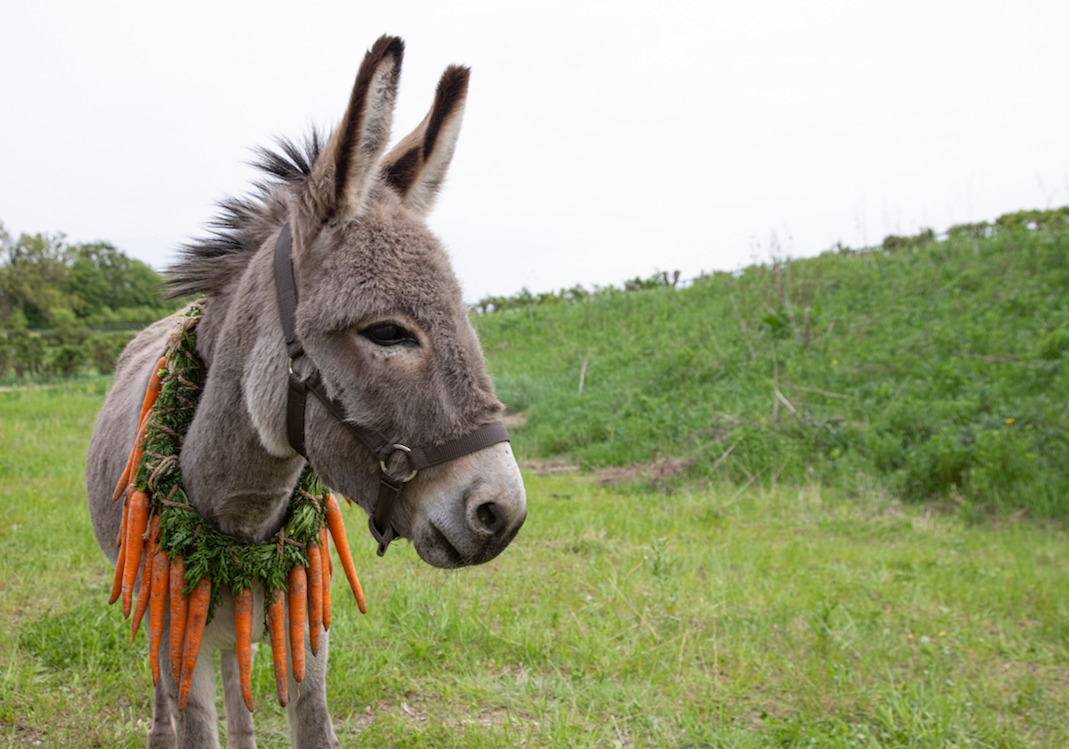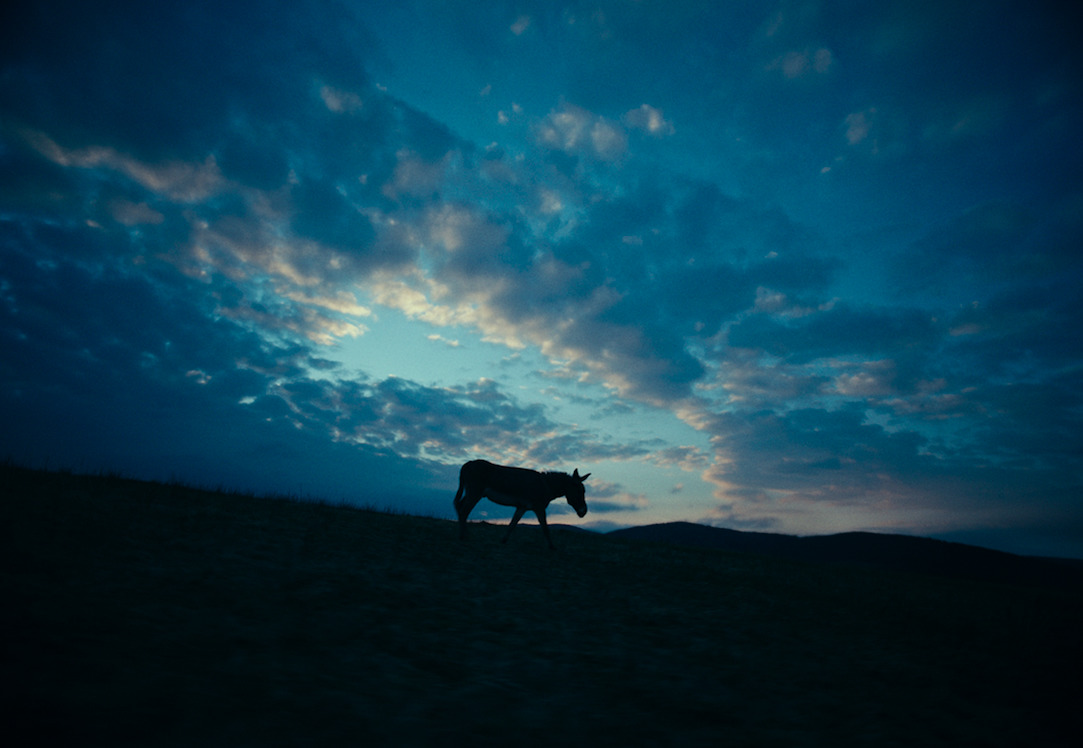
Poland’s entry for Best International Feature at the 2023 Academy Awards is a wondrous work of cinematic art. EO, directed by Jerzy Skolimowski, premiered at the 2022 Cannes Film Festival where it won the Jury Prize. The film is inspired by Robert Bresson’s 1966 film Au Hasard Balthazar, that was inspired by an extract from Fyodor Dostoyevsky’s novel The Idiot. In that passage the character of the Prince, when travelling to Switzerland, mentions his special fondness for donkeys that lead to a discernment: “I began to ask questions about them, for I had never seen one before; and I at once came to the conclusion that this must be one of the most useful of animals — strong, willing, patient, cheap; and, thanks to this donkey, I began to like the whole country I was travelling through; and my melancholy passed away.”
This is the exact feeling captured profoundly and exquisitely by the artistry of the Polish filmmaker. The donkey has been labelled by humanity as a dimwitted creature as early as sixth Century B.
C. when Isidore described the animal as “lazy and foolish” and Homer called it “tardus.” The Romans referred to a person who could not read and write as “donkey,” and the concept remained in modern times when Carlo Collodi in his Pinocchio gave the “donkey fever” to the children who did not study. However this animal is far from being foolish. On the contrary it has an excellent memory, a great ability to learn and it is equipped with exceptional emotional intelligence. The misunderstanding comes from the donkey’s stubborn nature, which is probably why the term “ass” has acquired a derogatory connotation. However this trait has not prevented mankind from exploiting this prodigious mammalian, first for agricultural activities and then for transport. But Skolimowski’s film finally liberates this outstanding creature.

EO is the story about a grey donkey with wistful eyes and a curious nature. He begins his life as a circus performer where he has has a special bond with acrobat Kasandra (Sandra Drzymalska). With the girl, Eo has a special relationship, an intimate communication, which passes through her loving caresses and her gentle voice. But when the circus is dismantled the two are separated.
The donkey with an onomatopoeic name thus begins a solo trip, that takes him to different countries and encounters. During his trek across the Polish and Italian countryside the four-legged protagonist meets a young Italian priest (Lorenzo Zurzolo), and a Countess (Isabelle Huppert), as well as a rambunctious Polish football team.
The immersive cinematography by Michal Dymek, that alternates cold colours with an expressionistic red, and the resonant score by Pawel Mykietyn, heighten the cinematic journey of the equine hero who traverses the societal evils we can all relate to. EO’s adventures speak to the world around us, serving as warning to the dangers of indifference and disrespect, all while on a quest for freedom.
This is the first film that the 84-year-old Polish director has made in seven years, and it comes across as an oeuvre full of genius and one of the best films of 2022. The metaphorical vision of EO not only allows viewers to identify with the donkey’s plight, but also sheds a light on the spirit of these remarkable equines.

Already throughout the inception with the script — penned by Skolimowski with Ewa Piaskowska — and eventually during filming, EO has been an odyssey of compassion to understand the donkey universe. Six hoofed mammals were cast for the titular role: Tako, Hola, Marietta, Ettore, Rocco and Mela. Jerzy Skolimowski explained that each one of them (similarly to humans), turned out to have their own personality that needed to be accommodated: “Donkeys have a surprisingly idiosyncratic nature. Each one we employed had a very different character, which made the execution of each shot quite unpredictable. It was like trying to solve an exciting puzzle every day; trying to find out what such and such donkey likes, or hates, fears or adores.” In this spectacular orchestration of animal-actors, every single facet of Eo leads us back to a sense of childhood wonder that we all possess and seek to regain while battling the pressures of adulthood that push us away from it. As Skolimowski beautifully puts it: “In our cynical and unforgiving world, innocence can pass for naivety, or can be taken for a sign of weakness. But I still endeavour to cultivate what is left of the innocence I have in me.”
By placing the viewer directly in the heart and mind of a donkey, we all have the chance to embark upon an interior journey questioning the deeper meanings of our interconnectedness with all beings. EO is a road trip like no other, that triggers humanity to be more respectful towards every Earthling and teaches us to find our true self by wandering solo and making the best out of any circumstance we stumble upon.
Final Grade: A*

